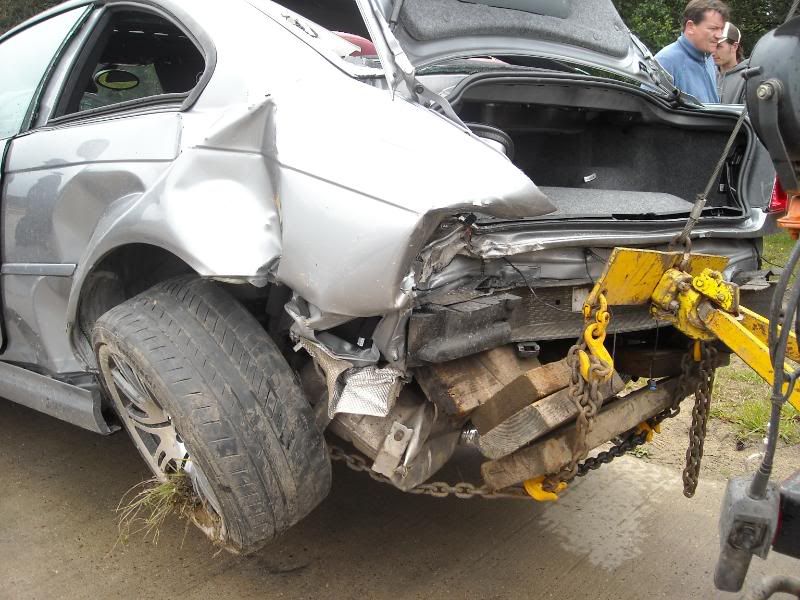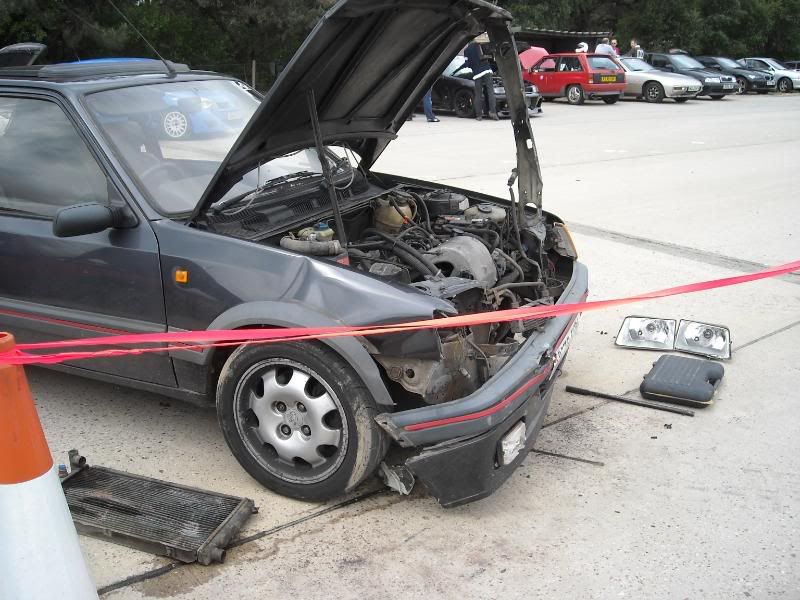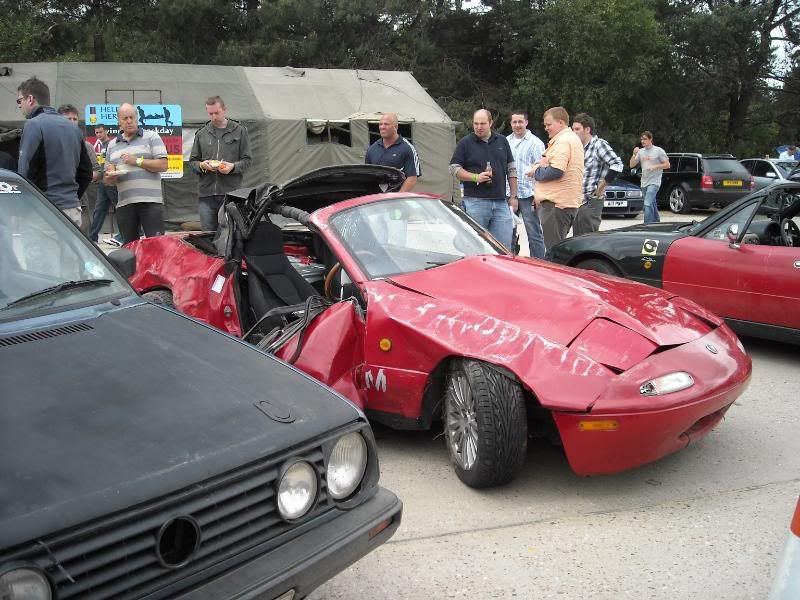why have bigger brakes?
#62
Scooby Regular
I've got an '03 Blob WRX PPP wagon with the Stock 4 / 2 pots. They were absolute ****e when I first bought the car.
But I've refurbed them with 8x new stainless pistons and seals in the front, ATE Superblue fluid and decent fast road pads all round and they're pretty impressive now I must say, the difference is night and day and the current setup could easily deal with more power.
But I've refurbed them with 8x new stainless pistons and seals in the front, ATE Superblue fluid and decent fast road pads all round and they're pretty impressive now I must say, the difference is night and day and the current setup could easily deal with more power.
#64
Scooby Regular
Join Date: Mar 2013
Location: Wales
Posts: 2,794
Likes: 0
Received 0 Likes
on
0 Posts
#65
Scooby Regular
Join Date: Mar 2013
Location: Wales
Posts: 2,794
Likes: 0
Received 0 Likes
on
0 Posts
Seniors such as yourself are relied upon to provide helpful posts, so please tell us which, in your opinion, are not only incorrect but could cost an owner unneccesary expense?
#66
Scooby Senior
Thread Starter
#67
BANNED
iTrader: (20)
uprated his engine too 350 bhp but didnt bother with better brakes, 3rd lap around hit them hard for quarry, they had overheated and stopped working.
straight into the wall and written off.
i bet he wishes he had bothered with bigger brakes as they dissipate heat better so dont fade when you really need them approaching quarry at 100 plus mph.
#68
Scooby Regular
iTrader: (23)
Join Date: Jul 2008
Location: In the fast lane
Posts: 3,458
Likes: 0
Received 0 Likes
on
0 Posts
With your foot off the accelerator the throttle is closed so you have minimum air available for combustion. Proportionally you will also have very little fuel being burnt. Without the products of combustion (exhaust gasses) your turbo is doing no more work than if the engine was at idle.
#69
Scooby Regular
Join Date: Mar 2013
Location: Wales
Posts: 2,794
Likes: 0
Received 0 Likes
on
0 Posts
Basically an incorrect statement.
With your foot off the accelerator the throttle is closed so you have minimum air available for combustion. Proportionally you will also have very little fuel being burnt. Without the products of combustion (exhaust gasses) your turbo is doing no more work than if the engine was at idle.
With your foot off the accelerator the throttle is closed so you have minimum air available for combustion. Proportionally you will also have very little fuel being burnt. Without the products of combustion (exhaust gasses) your turbo is doing no more work than if the engine was at idle.
It doesn't shut down.
If an engine is doing 3k rpm then with or without the throttle open it's still producing the power at that point, the only difference being that the engine is being slowed ie. the power will drop off.
The key there is to compare dynos - which car provides more bhp and/or torque at any particular rpm?
An engine with more power available at, say, 3000 rpm will provide more impetus and hence require more braking energy than a lesser one.
Braking doesn't just mean stopping momentum, it also involves overcoming the impetus that produces momentum (and inertia but that's a whole new thread.....
 ).
).
#70
Scooby Regular
iTrader: (23)
Join Date: Jul 2008
Location: In the fast lane
Posts: 3,458
Likes: 0
Received 0 Likes
on
0 Posts
If you have your foot off the gas and the engine is doing 3k rpm it's being driven by the kinetic energy produced by the car, not by the energy released from combustion. As you say the car and all its moving parts have momentum, and it is this that is moving the car, not the turbo or anything else to do with combustion.
Not only is the throttle closed thereby depriving the combustion process of oxygen, but the ECU, sensing the throttle position, will cut injector function to idle, or near idle fuel delivery. You can't be slowing down by cutting power and driving by producing power at the same time.
I believe modern ECU systems cut fuel completely during braking and just run air through the cylinders, how would your argument work in that scenario?
Not only is the throttle closed thereby depriving the combustion process of oxygen, but the ECU, sensing the throttle position, will cut injector function to idle, or near idle fuel delivery. You can't be slowing down by cutting power and driving by producing power at the same time.
I believe modern ECU systems cut fuel completely during braking and just run air through the cylinders, how would your argument work in that scenario?
#71
Scooby Regular
iTrader: (7)

edit to add, it also depends what those materials consist of, but I can't be arsed to go through all that crap now, i'm a tad hung over, so ill just put surface area, brake and disc compound, force applied along with road surface and weather conditions and tyre compound temp of both, and **** loads of other stuff involving air temp density and drag, it's really a very in depth subject with multiple considerations. phew.
Last edited by ditchmyster; 22 July 2013 at 10:56 AM.
#72
#73
At some point larger brakes won't benefit you on the road, it's only if you are tracking it and suffering from fade that they come into their own. The bigger brakes wear slower and cool faster, they can apply more clamping force to a tired pad so mitigate wear better.
#74
Scooby Senior
iTrader: (34)

#76
Scooby Senior
iTrader: (34)
At some point larger brakes won't benefit you on the road, it's only if you are tracking it and suffering from fade that they come into their own. The bigger brakes wear slower and cool faster, they can apply more clamping force to a tired pad so mitigate wear better.
#77
Scooby Regular
Join Date: Mar 2013
Location: Wales
Posts: 2,794
Likes: 0
Received 0 Likes
on
0 Posts
When I'm in a line of traffic (queuing at junction, lights etc.) I can let the clutch out and the car rumbles forward at a few mph.
Without the throttle open it keeps moving forward - albeit at a slow pace - until I brake, and would continue to do so until it ran out of fuel (on the theoretical endless straight, level road).
That's because the engine still provides propulsion, from the tickover revs of course.
Although this should NOT be attempted, a test would be to take a car to, say, 60, and then simply stamp on the brakes until it stops. Measure the time and/or distance taken.
Then do the same again, but this time with the car in neutral.
If the latter proves to be the quickest/shortest then the 'impulsion' view is likely to be correct, at least in part.
(Btw by the time we've tried all these tests of the many theories the brakes would probably be shot anyway )
)
Without the throttle open it keeps moving forward - albeit at a slow pace - until I brake, and would continue to do so until it ran out of fuel (on the theoretical endless straight, level road).
That's because the engine still provides propulsion, from the tickover revs of course.
Although this should NOT be attempted, a test would be to take a car to, say, 60, and then simply stamp on the brakes until it stops. Measure the time and/or distance taken.
Then do the same again, but this time with the car in neutral.
If the latter proves to be the quickest/shortest then the 'impulsion' view is likely to be correct, at least in part.
(Btw by the time we've tried all these tests of the many theories the brakes would probably be shot anyway
 )
)
#79
Ok at very high speeds they might benefit. I'm not sure actually. But I could have driven down the road at say 40 mph in my old classic STI, stomped on the standard brakes and made the ABS kick in. This tells me that the tyres are what limits braking power.
#80
Scooby Regular
Join Date: Mar 2013
Location: Wales
Posts: 2,794
Likes: 0
Received 0 Likes
on
0 Posts
It's the most relevant point in the whole topic, and is the deciding factor for how quickly or not any objet in motion and contact with another surface or not as the case may be, reduces speed or not as the case may be.
edit to add, it also depends what those materials consist of, but I can't be arsed to go through all that crap now, i'm a tad hung over, so ill just put surface area, brake and disc compound, force applied along with road surface and weather conditions and tyre compound temp of both, and **** loads of other stuff involving air temp density and drag, it's really a very in depth subject with multiple considerations. phew.

edit to add, it also depends what those materials consist of, but I can't be arsed to go through all that crap now, i'm a tad hung over, so ill just put surface area, brake and disc compound, force applied along with road surface and weather conditions and tyre compound temp of both, and **** loads of other stuff involving air temp density and drag, it's really a very in depth subject with multiple considerations. phew.
Your edit shows that my intention worked ie. to potentially expand this into a full-blown physics seminar.
er. no.... I meant for you or someone to show that there's so many variables and things to take into account that it 's almost impossible to get an answer everyone will agree on, because one view will lead to an alternative view based on another principle of physics etc. etc.
I think the OP should be congratulated for providing us with last week's 'all-weekender' thread.

Oh - almost forgot.
What about inertia?


#81
When I'm in a line of traffic (queuing at junction, lights etc.) I can let the clutch out and the car rumbles forward at a few mph.
Without the throttle open it keeps moving forward - albeit at a slow pace - until I brake, and would continue to do so until it ran out of fuel (on the theoretical endless straight, level road).
That's because the engine still provides propulsion, from the tickover revs of course.
Without the throttle open it keeps moving forward - albeit at a slow pace - until I brake, and would continue to do so until it ran out of fuel (on the theoretical endless straight, level road).
That's because the engine still provides propulsion, from the tickover revs of course.
#82
Scooby Regular
Join Date: Mar 2013
Location: Wales
Posts: 2,794
Likes: 0
Received 0 Likes
on
0 Posts
Three pages in and I think a fairly simple concept has been over complicated to the point where we need a physics professor to explain all the variables. Given the direction of the discussion we will be talking about the gearing and aerodynamic effect on slowing the car next.


See later post

#83
Scooby Regular
Join Date: Mar 2013
Location: Wales
Posts: 2,794
Likes: 0
Received 0 Likes
on
0 Posts

And in my case lose a few kilos.
(Mmm
 perhaps also throw the missus out of the car).
perhaps also throw the missus out of the car).
#86
I'm not sure. If the master cylinder is the same then I don't think you can apply force faster?
#88
Scooby Regular
iTrader: (7)
First, apols if it came over that I was being dismissive. I wasn't.
Your edit shows that my intention worked ie. to potentially expand this into a full-blown physics seminar.
er. no.... I meant for you or someone to show that there's so many variables and things to take into account that it 's almost impossible to get an answer everyone will agree on, because one view will lead to an alternative view based on another principle of physics etc. etc.
I think the OP should be congratulated for providing us with last week's 'all-weekender' thread.
Oh - almost forgot.
What about inertia?

Your edit shows that my intention worked ie. to potentially expand this into a full-blown physics seminar.
er. no.... I meant for you or someone to show that there's so many variables and things to take into account that it 's almost impossible to get an answer everyone will agree on, because one view will lead to an alternative view based on another principle of physics etc. etc.
I think the OP should be congratulated for providing us with last week's 'all-weekender' thread.

Oh - almost forgot.
What about inertia?



exactly.

#89
Scooby Regular
iTrader: (23)
Join Date: Jul 2008
Location: In the fast lane
Posts: 3,458
Likes: 0
Received 0 Likes
on
0 Posts
I don't dispute the fact that your engine produces a certain amount of torque at idle, sufficient to move the car at low speed, but this...
and this...
are not the same thing, otherwise your engine would be idling at higher (3k rpm as your example quotes) speed.
This doesn't need to be a class in applied physics.
Simple common sense and a working mechanical knowledge will suffice
This doesn't need to be a class in applied physics.
Simple common sense and a working mechanical knowledge will suffice

#90
Scooby Regular
iTrader: (61)
Join Date: Aug 2005
Location: N.I
Posts: 3,444
Likes: 0
Received 0 Likes
on
0 Posts
When I'm in a line of traffic (queuing at junction, lights etc.) I can let the clutch out and the car rumbles forward at a few mph.
Without the throttle open it keeps moving forward - albeit at a slow pace - until I brake, and would continue to do so until it ran out of fuel (on the theoretical endless straight, level road).
That's because the engine still provides propulsion, from the tickover revs of course.
Although this should NOT be attempted, a test would be to take a car to, say, 60, and then simply stamp on the brakes until it stops. Measure the time and/or distance taken.
Then do the same again, but this time with the car in neutral.
If the latter proves to be the quickest/shortest then the 'impulsion' view is likely to be correct, at least in part.
(Btw by the time we've tried all these tests of the many theories the brakes would probably be shot anyway )
)
Without the throttle open it keeps moving forward - albeit at a slow pace - until I brake, and would continue to do so until it ran out of fuel (on the theoretical endless straight, level road).
That's because the engine still provides propulsion, from the tickover revs of course.
Although this should NOT be attempted, a test would be to take a car to, say, 60, and then simply stamp on the brakes until it stops. Measure the time and/or distance taken.
Then do the same again, but this time with the car in neutral.
If the latter proves to be the quickest/shortest then the 'impulsion' view is likely to be correct, at least in part.
(Btw by the time we've tried all these tests of the many theories the brakes would probably be shot anyway
 )
)Put quite simply, in terms of your initial point about the 300bhp and 200bhp car, if engine geometry and compression ratio etc etc is the same then one will be no harder to stop than the other in terms of engines.







